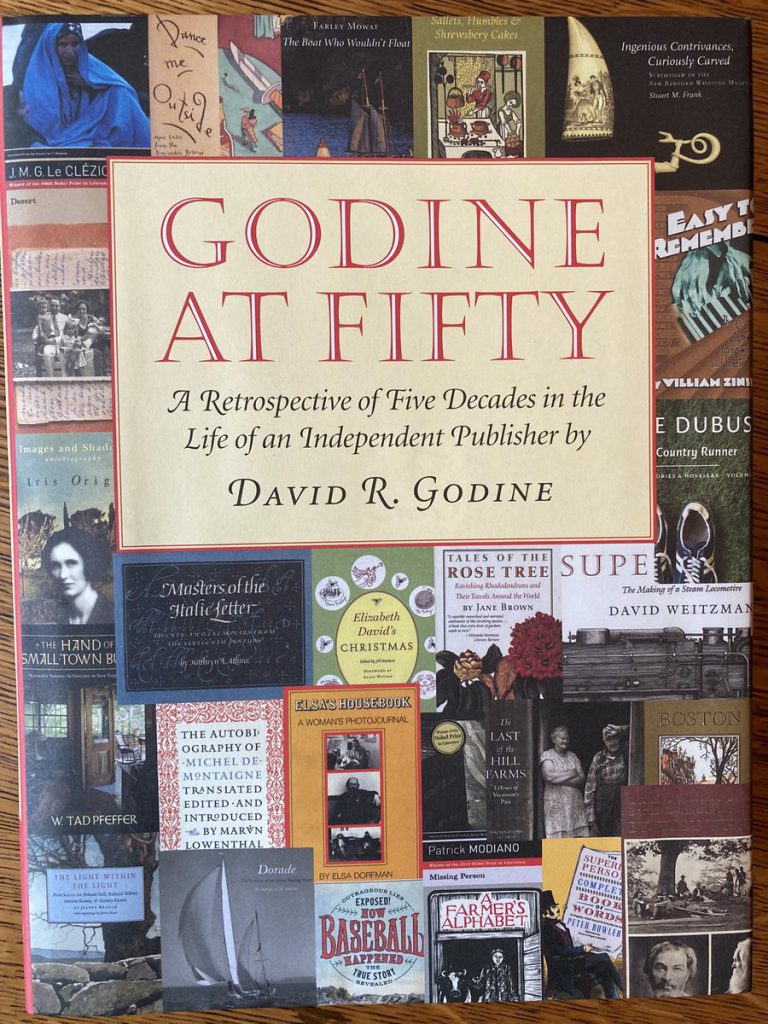
Author: Henry Wessells
a vitrine at the Book Fair

The most striking vitrine I saw at the recent New York Antiquarian Book Fair was this display of the artist books of Heide Hatry and related botanicals at the booth of Sanctuary Books. Hatry’s transformations are playful and provocative, and gorgeous to hold in the hand.
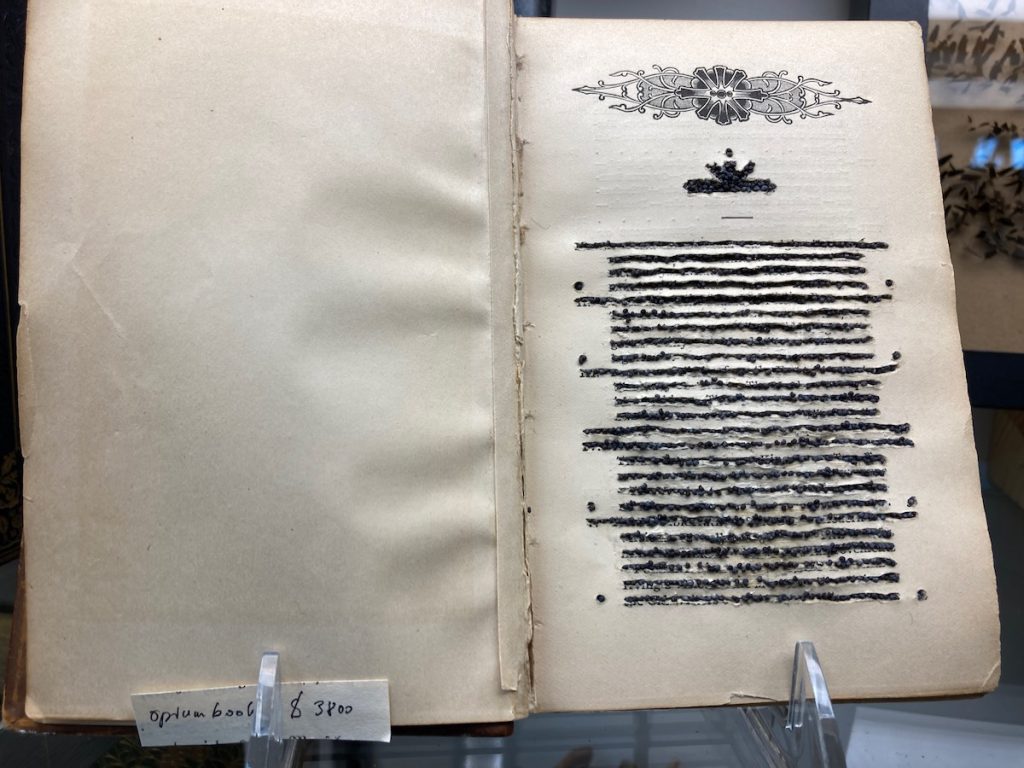
[Opium Book, with poppy seed text.]
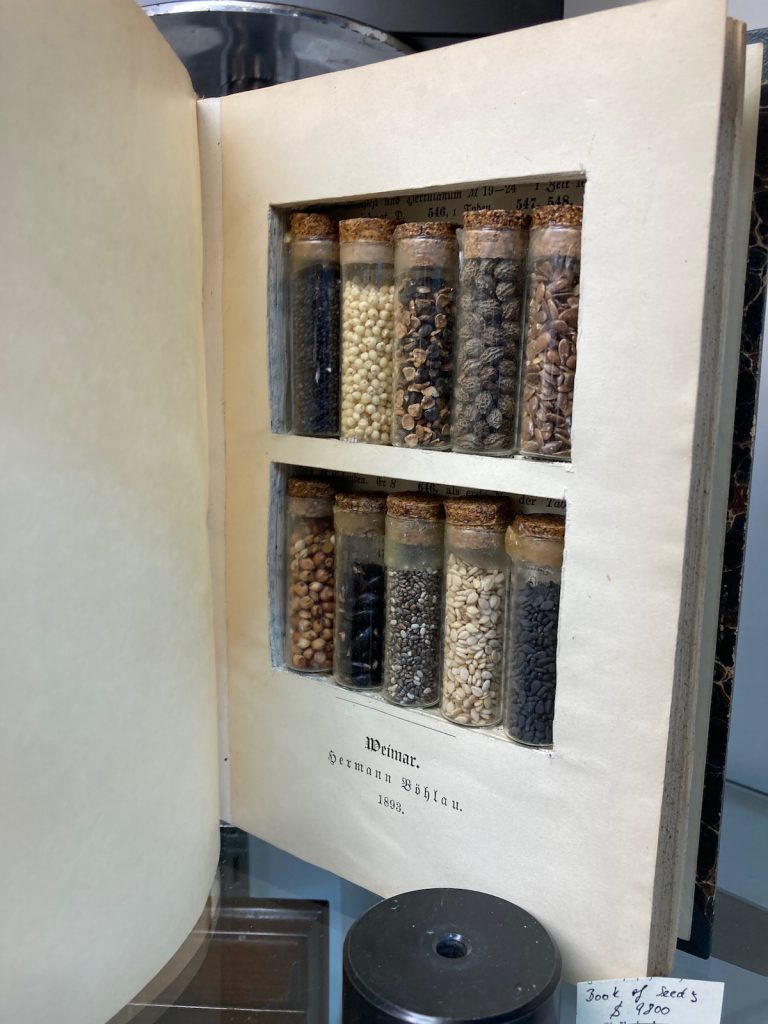
[Book of Seeds]

[A prickly text.]

[Secret library in a pomegranate.]
A Wunderkammer in Virginia
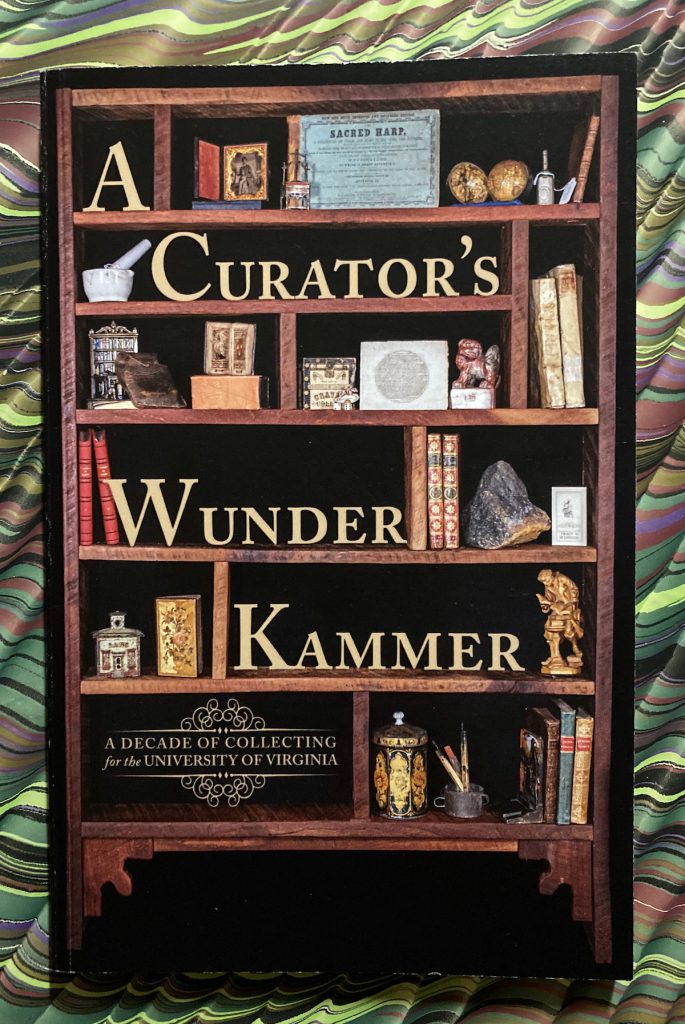 — David R. Whitesell. A Curator’s Wunderkammer. A Decade of Collecting for the University of Virginia. Exhibition Catalog. [Charlottesville: University of Virginia Library], 2022. Illustrated throughout. [iv], 105 pp. Edition of 500 copies [in fact, 310]. $25.00.
— David R. Whitesell. A Curator’s Wunderkammer. A Decade of Collecting for the University of Virginia. Exhibition Catalog. [Charlottesville: University of Virginia Library], 2022. Illustrated throughout. [iv], 105 pp. Edition of 500 copies [in fact, 310]. $25.00.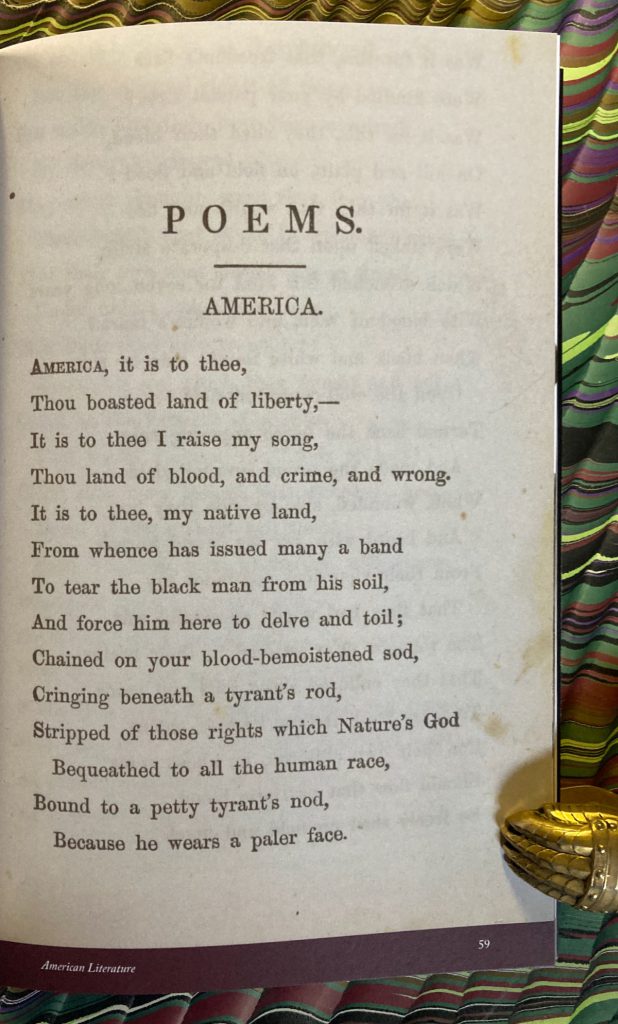
[Note: Some copies were issued with an added presentation leaf (inscribed to the individual booksellers identified as sources). The colophon states 500 copies printed, but due to paper shortages only 310 were in fact printed. If you want one, best to act soon. Details: https://at.virginia.edu/wunderkammer]
A Book of Ryhmes by Charlotte Bronte
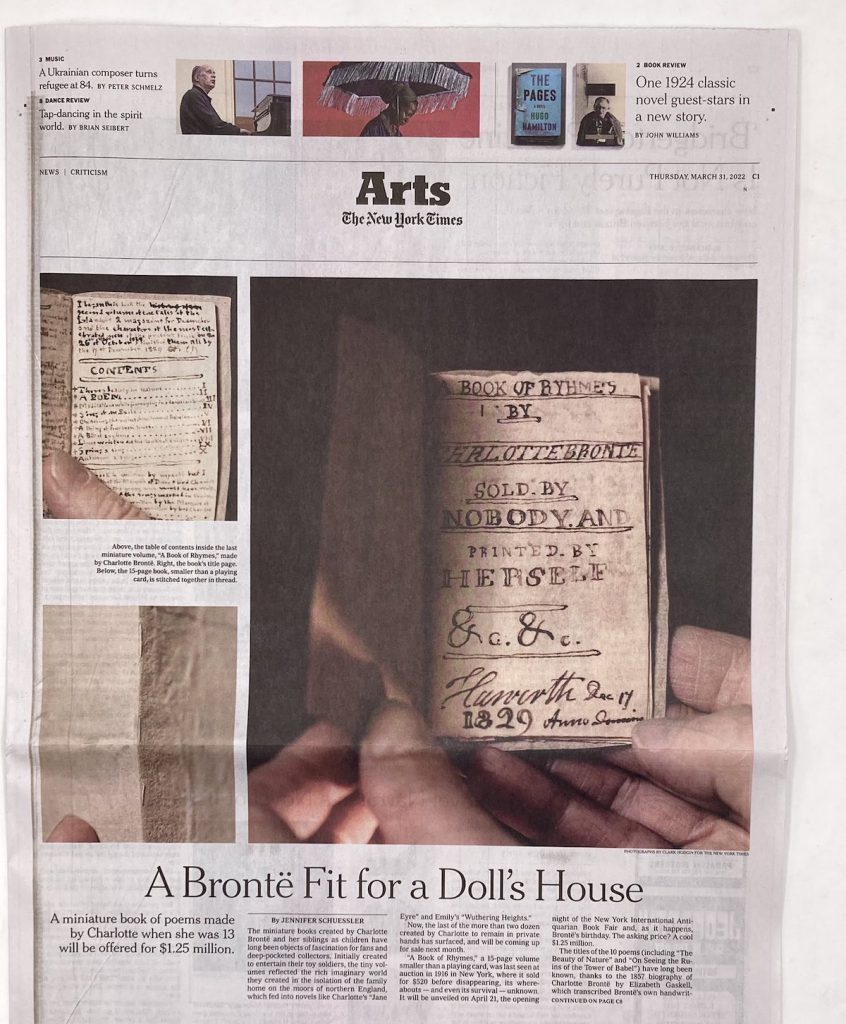
It’s a nice to have a brief role in the long history of this manuscript, and to be part of this joyous chapter in the history of the book trade. See you at the book fair.


The Dead of the House by Hannah Green
The Endless Bookshelf is many things, but it is above all a series of notes on reading and thinking about books, as texts and as objects. More than a decade ago, a friend gave me a copy of the paperback reprint of The Dead of the House by Hannah Green, deeming rightly that I would appreciate. I read it with pleasure and gave a copy to friend with an affinity for books and for the wood, and he enjoyed it, too. It was Green’s only novel (technically, in science fiction terms, a fixup composed of several linked stories), all the more remarkable for that, perhaps.
I often thought about the book over the years, and then not long ago I saw an inscribed copy of the original edition, published by Doubleday in 1972, and, as one does, thought about it some more. I began re-reading the book, and then turned up a more interesting copy.
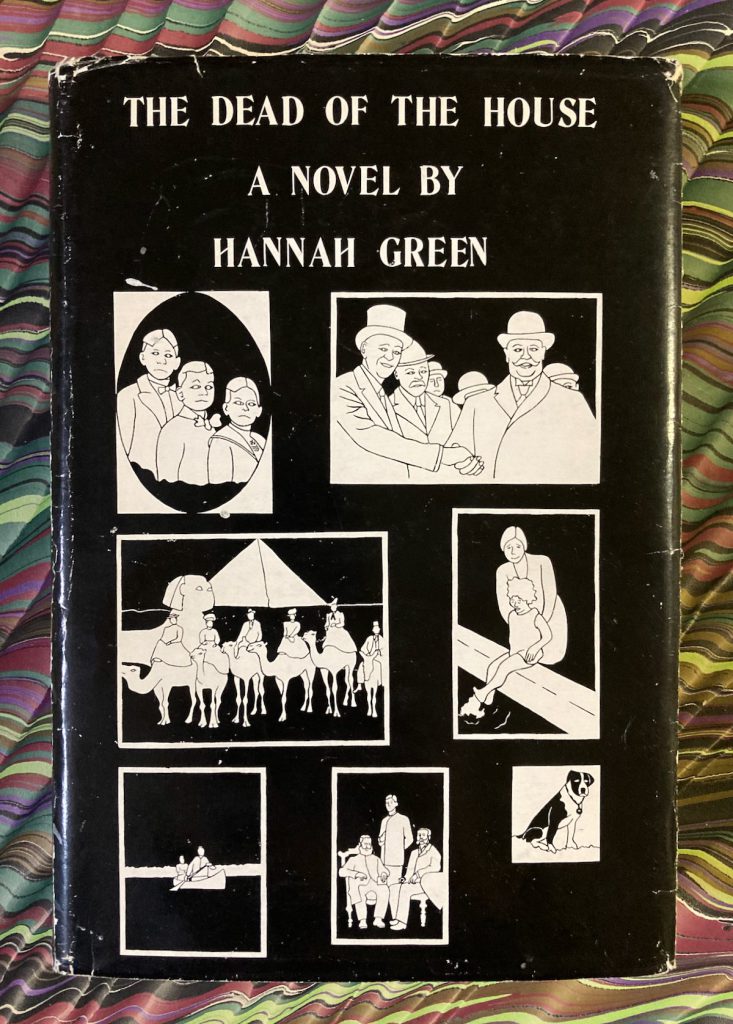
— Hannah Green. The Dead of the House. Doubleday, 1972. Inscribed by the author, “For Dieter With my Love Hannah New York, April 1972”. With printed pictorial dust jacket by John Wesley, inscribed on the blank front flap, “Cover for Dieter John Wesley 1972”, and retaining original publisher’s dust jacket with text front panel and author portrait on back panel.
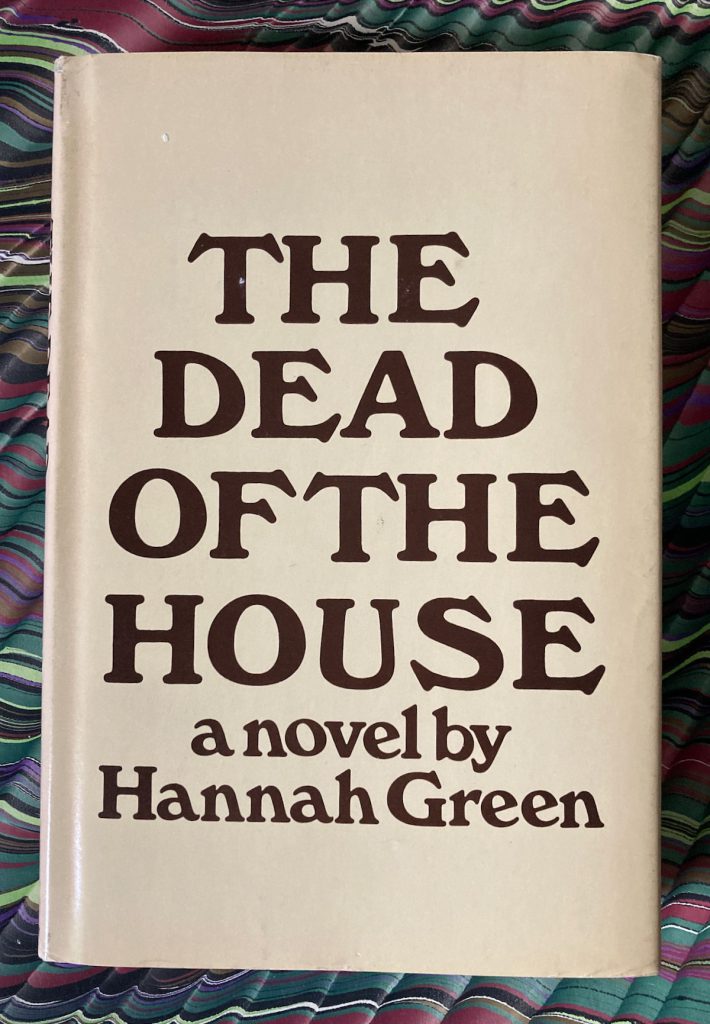
Hannah Green (1927-1996) married painter John Wesley in 1971. His jacket images are closely linked to the text and the look is not dissimilar to his other graphic work at the time (especially some early works, such as Alice or the Radcliffe Tennis team) and a little more somber than the pop art motifs for which he is best known. Was it a trial proof for a design rejected by Doubleday ? And, of course, one wonders about the identity of the Dieter to whom the book is inscribed.* To be continued, perhaps.
[* possibly German artist Dieter Roth, whose work was sometimes exhibited with John Wesley’s at about this time.]
Literature and the Matter of America

— Paul Witcover. Lincolnstein. A Novel. [Hornsea:] PS, [2021]. 155 pp. Pictorial boards, dust jacket after Carl Pugh.
Paul Witcover’s Lincolnstein is a concise and nimble critical fiction, an original and moving work expressed from the collision of historical incident and literary texts. It is a novel of ideas in motion, from the headlong rush of the kidnapping of a Confederate military surgeon by two spies from Pinkerton’s Union Intelligence Service to the shocking purpose behind their deed. Mary Shelley’s Frankenstein, or, The Modern Prometheus is invoked upon the title page, but within the story the allusions emerge organically. President Lincoln has been assassinated and Stanton intends to put to use the theories of the brother of the doctor, one Victor —. “What brother? I have no brother.” is the response of the Confederate doctor who squeaks like a “Dutchman”, and yet he recognizes the apparatus assembled in the train-car laboratory. After warning, “Your President is dead […] If you loved him you would leave him that way”, the surgeon agrees, under duress, to perform the task. This conceit is bold enough, and then with the turn of a page the reader makes one more heart-wrenching discovery, and learns the other literary text with which the novel converses. Go read the book and experience it.
— — —
The resonances of Frankenstein are a stratum of bedrock, the earlier novel visible in the revulsion at the success of the process, in the flight of the monster, in the prodigious strength of the revived Lincoln and the polished oratory (Lincoln’s speeches rather than Milton’s Paradise Lost), and Mary Shelley’s novel propels the arc of the novel towards its conclusion. And yet, equally organically, the biggest and boldest of Witcover’s moves is to have Captain Finn lift the sheet from the face of another corpse in the laboratory, and in that act reveal who he is, and what his loss is. Finn’s initial disbelief yields to cold rage and he announces, “There has been a slight change of plans, Doc.”
That had been a life fit for kings. Catfish for supper, pipe always full, easy conversation all day as the shore slipped by in endless green unfurling, the river adding its voice to their own. He would have stayed there forever if he could.
A novel, like life, is motion and change, not stasis. The electricity stored in the laboratory revives the body of the president, and everything changes. Instead of the brain of the dead white bumpkin intended to render the president compliant, Lincoln’s skull now contains the brain of Jim Watson, who had been fatally wounded while helping Capt. Huckleberry Finn kidnap the doctor. Lincoln bursts from the train, and Finn pursues him, with orders from Pinkerton but with his own sense of mission. If Frankenstein impels the novel into action, the energy of Adventures of Huckleberry Finn shapes the subsequent course of events as Jim travels stealthily through the ruined landscape of war in search of his enslaved wife and children. Witcover writes short monologues, crisp vignettes of people who encounter the errant Lincoln and aid him on his way. These many supporting voices are one of the pleasures of the book.
— — —
Did you really think the Matter of America leads to a happy ending? If the legend of King Arthur is the Matter of Britain, fraud and race are the Matter of America. The other day, I came across a pamphlet on racial equality and equal suffrage from 1865, in which the pretense of America as a “white man’s country” is dismissed by the black writers of the pamphlet: “Every school-boy knows that within twelve years of the foundation of the first settlement at Jamestown, our fathers as well as yours were toiling in the plantations on James River.”
Since Pinkerton has told Finn of the Mississippi plantation where Jim’s kin are being held, Finn dogs the reanimated Lincoln’s footsteps and they soon find each other. It is not an easy reunion, and Witcover deftly brings home blunt truths, in ways Clemens could only hint at in Huckleberry Finn and in The Tragedy of Pudd’nhead Wilson and the Comedy Those Extraordinary Twins (1894). Jim as Lincoln is articulate about the relations between black and white in America:
There ain’t nothing you white folks like to believe in more than the idea of your own goodness. You will ignore all evidence to the contrary, just to make yourselves feel better about all the evil that you have done or allowed to be done in your name. Sure, white folks pity a blind man. But that ain’t nothing compared to the pity you feel for the real victims of this misbegotten world: your own damn selves. It’s a story you don’t never get tired of telling, nor of hearing.
This is very direct, perhaps I have not chosen the best passage, for the discussions of Huck’s black rage and Jim’s quest are natural and seamless and the infodump is nowhere to be seen.
Jim says of his Lincoln memories, “I can feel the tug of all that was dear to him. And hateful too. Everything that touched him, for good or ill. It’s like I’m a big old spider sitting at the center of a web he spun in life.” Huck remarks on the revived president’s “steady pumping heart”, but the voice and heart of the novel are Jim Watson coming to terms with the world and the body he now inhabits.
Witcover has found the appropriate mode to convey a common usage in the world of the novel, in simply writing n——, as profanity was once elided in Victorian fiction: every one knows the word, but we don’t, can’t use it the way it was used in 1865 (or in St. Petersburg, Missouri, in 1845, or in the novel published in 1885). That is the only concession made to current discourse, and there is no evasion of the brutality of the slave system or its intertwining with American life in North or South.
In Huck and Jim’s march to the banks of the Mississippi, Witcover’s novel converses or collides with aspects of Thomas M. Disch’s Camp Concentration (the brain swap), the recent novel by George Saunders, William Faulkner, Walt Whitman, and Ambrose Bierce’s “An Occurrence at Owl Creek Bridge”. These are not merely allusions but are integrations and transformations of that material which advance the plot and present a critical response to the precursor texts. And the key text remains Huckleberry Finn. Disguised as a blind veteran and his loyal bondsman, Huck and Jim reach Terra, the vast, prosperous De Spain plantation, which remains untouched by war and emancipation. The gross, bloated Major de Spain has made sure of his accommodations with those in power. All these elements of deceit and cozying up to power and selfishness are discernable in Clemens’ novel. The deceptions are monstrous, far more appalling than the idea of reviving the corpse of Abraham Lincoln, and the rotten structure cannot withstand the monster’s rage. And then, in a beautiful concluding passage which links both Frankenstein and Huckleberry Finn, Jim leaves the burning plantation, carrying the corpse of the person inseparable from him — just as the monster carried Victor’s corpse out into the endless Arctic wastes, so Jim lowers Huck’s lifeless body onto a timber flatboat and joins the flowing river: “The raft receded, his upright figure silhouetted in the gleam of reflected flames. Then the current took him, and he was lost in darkness.”
[HWW]
fifteen years of the Endless Bookshelf
24 January 2022
Your correspondent celebrates fifteen years of simply messing about in books on this website (it started here, but of course the mischief and fun and seriousness go back much further). There are a few regular readers of the ’shelf, and perhaps once in a while a new reader will come across something in the archives which cannot be found elsewhere. I continue to read Proust in the Pléiades edition, with great interest and pleasure; I am now at the stage of Le Côté de Guermantes, and there is no stopping. There are also other books which come to hand, as I usually have a second or a third book which I am reading, or at least reading at. Some of them are noted below. I omit the names of several bibliographies I have been consulting as these fall under work in progress.
I have written a few essays recently where the lead time for publication is rather longer than for the Endless Bookshelf: I received Paul Witcover’s new book late last week, read it, and finished the review a couple of days later; and even had time to look at it in the cold light of day before posting it. That flexibility is one reasion why I figure I will keep writing these chronicles of small beer for a while longer. Perhaps you will want to read them.
I am very much looking forward to reading Robert Aickman An Attempted Biography by R. B. Russell (Tartarus Press); I have read some of Aickman’s stories but by no means all of them.
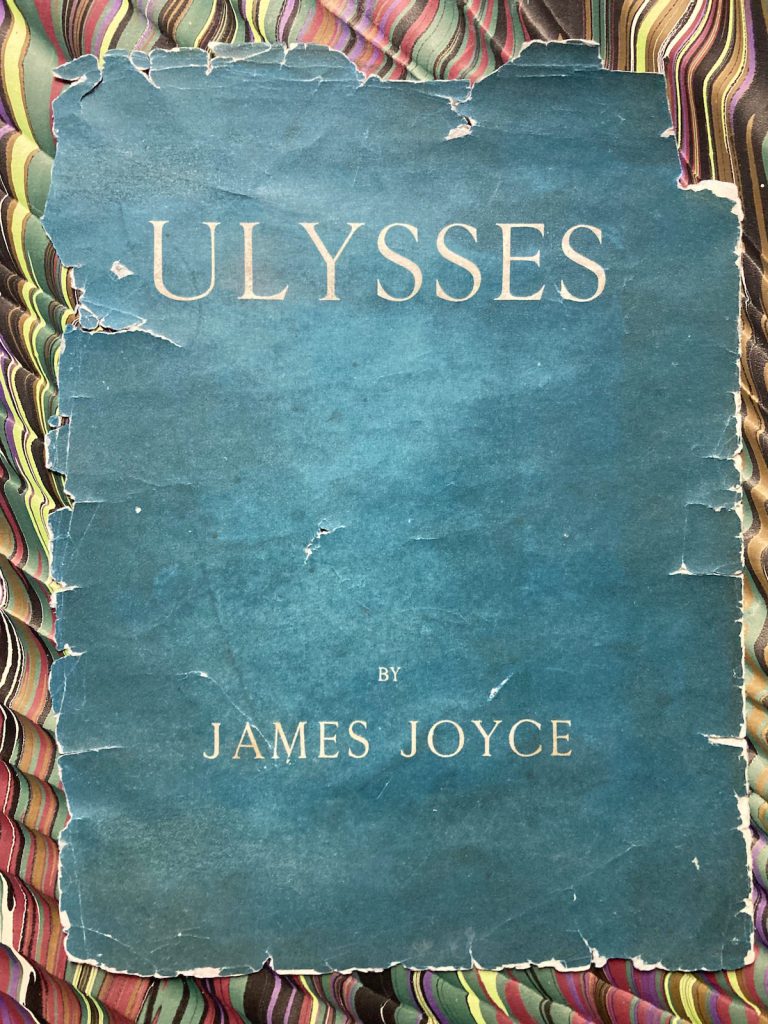
Wednesday 2 February marks the centenary of James Joyce’s Ulysses, published as a book in Paris on the author’s fortieth birthday in 1922. This is the darkened and tattered remains of the front wrapper of one of the 750 ordinary copies of the first edition, one of those scraps of paper which demand to be saved.
— — —
In February, I expect to be at the California International Antiquarian Book Fair in Oakland, booth 504 (James Cummins Bookseller) at the Oakland Marriott City Center, Friday 11 February through Sunday 13 February. If you are in the Bay Area, come by and say hello (and please let me know in advance if you would like a pass).
— — —
recent reading
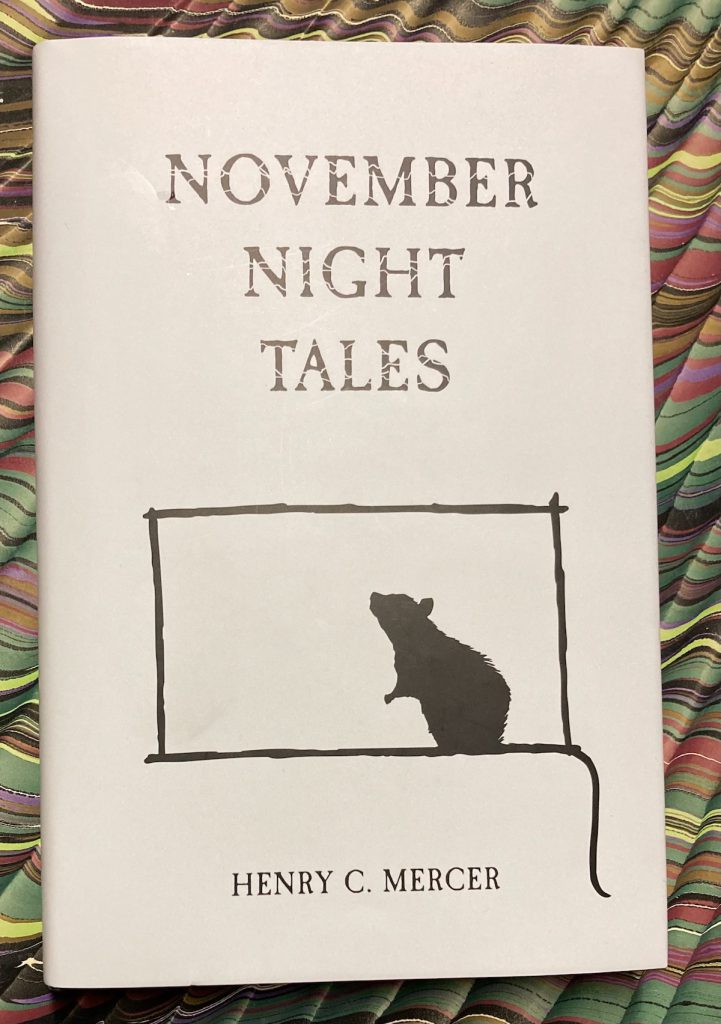
— Henry C. Mercer. November Night Tales [1928]. [Introduction by Peter Bell]. Swan River Press, 2015.
Supernatural tales by the Pennsylvania polymath archaeologist, ceramicist, and polymath Henry C. Mercer (1856-1930), who was educated at Harvard (Class of 1879) and as a ceramicist played a key part in the American Arts and Crafts movement. His poured concrete mansion, Fonthill — named for William Beckford’s Gothic folly — is a turn of the century wonder; and his collections of American tools and vernacular objects pioneered the preservation of what is now called material culture. These stories range from rural Pennsylvania folklore to a forgotten treasure in the Italian Alps. The best of them is “The Wolf Book”, a tale of werewolves in the Balkans and an ill-starred book.
— Richard Thompson, with Scott Timberg. Beeswing. Losing My Way and Finding My Voice 1967-1975. Algonquin Books of Chapel Hill, 2021.
Memoir by one of the founders of Fairport Convention; his fabulous 1968 dream of Keith Richards and south London is worth the price of admission. Thompson played a solo acoustic show at a local Montclair venue not too long before the pandemic, and “1952 Vincent Black Lightning” was one of the great moments of that evening. Thompson’s songs express — like the late novels of Russell Hoban — the curious notion that loss is the great creative well for literature and song. Sad and beautiful can be triumphant at the same time, because the song outlasts the sorrow.
— T. Frank Muir. Hand for a Hand. Soho Crime, [2012]. Crime novel set in St. Andrews, Scotland.
— Sara Gran. The Book of the Most Precious Substance. A Novel. Dreamland Books, [2022].
— Michael Shea. Mr. Cannyharme. A Novel of Lovecraftian Terror. Foreword by Linda Shea. Edited by St. Joshi. Hippocampus, [2021].
San Francisco at the beginning of the AIDS crisis, with interdimensional beings, written by Michael Shea circa 1981. I found the first half of the book interesting, with well grounded scenes around the Tenderloin hotel managed by the writer-protagonist, and some choice, weird secondary characters. My interest waned as the supernatural elements unfolded.
the best book of the year – 2021
‘merging, not with the car, but with the road’
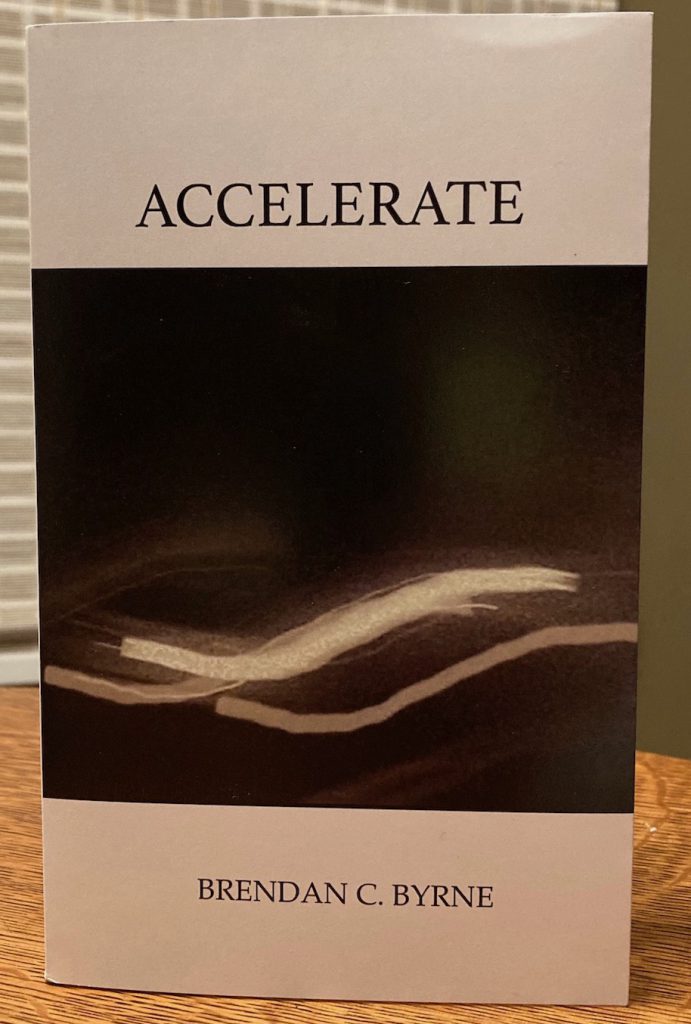
— Brendan C. Byrne. Accelerate. 96 pp. Small 8vo, [Moonachie, New Jersey], 2022 [i.e., 3 November 2021]. Pictorial wrappers, dust jacket with french flaps. From a small edition printed for the author just before the publication of the e-booke by Neotext. The title page verso reads Copyright 2020.
This is a remarkable book. In a future Los Angeles, couriers caged with their autonomous vehicles pound nutritional “sluice” and make deliveries at 198 m.p.h. Joam has refused to let the hardware make all his driving decisions yet lives almost integrated within his armored “beater”. He receives a commission to deliver a packet to New York within 72 hours. The narrative is all attitude and the lingo is a brilliant street jargon, an immersive account of Joam hurtling across the landscape of American political collapse, seeing off jealous rivals. Some of Byrne’s earlier work, such as “a Stone and a Cloud”, seems to chart the erosion of humanity in the technological future. Accelerate is a gonzo cross-country road-trip — west to east — which tells a moving story of personal loss as, paradoxically, the machine becomes human. The best book of the year 2021.
recent reading : december 2021
current reading :
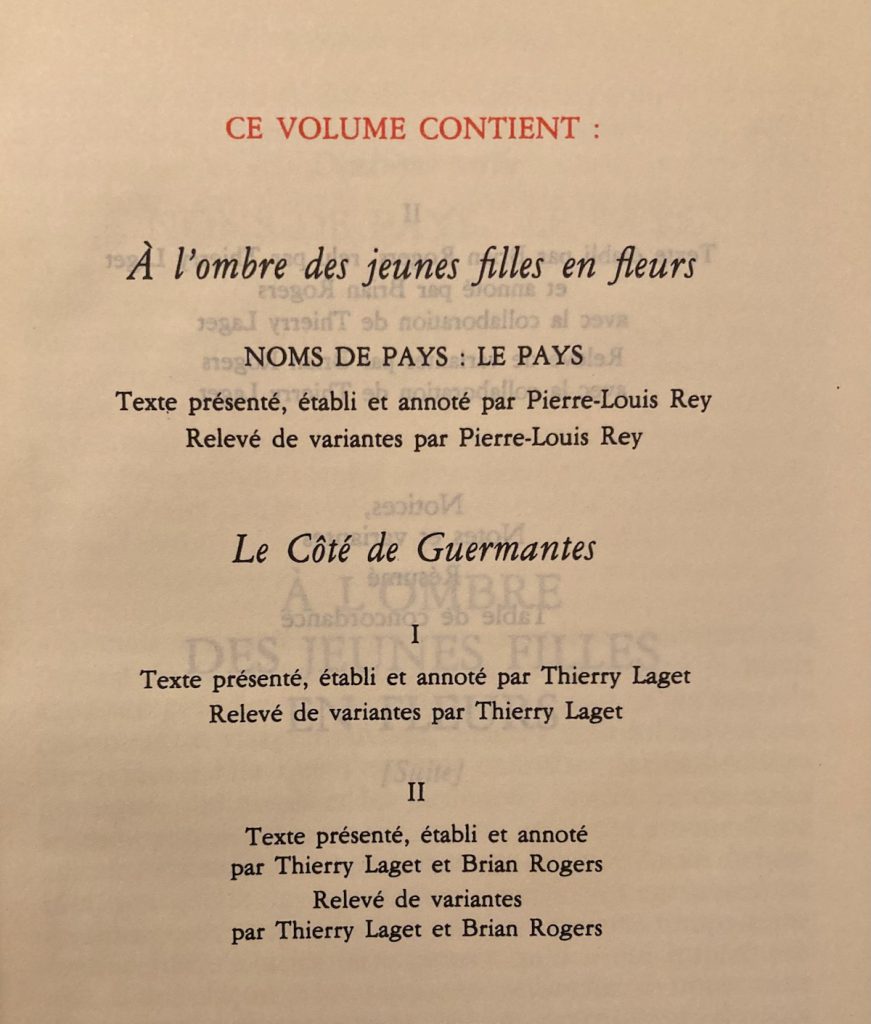
— Marcel Proust. À la recherche du temps perdu. [Bibliothèque de la Pléiade]. NRF Gallimard, [2019].
Ongoing project and a source of great pleasure. Am about a third of the way in.
recent reading :
— Julian Symons. The Blackheath Poisonings. A Victorian Murder Mystery. Harper & Row, [1978].
— —. The Kentish Manor Murders. Viking, [1988].
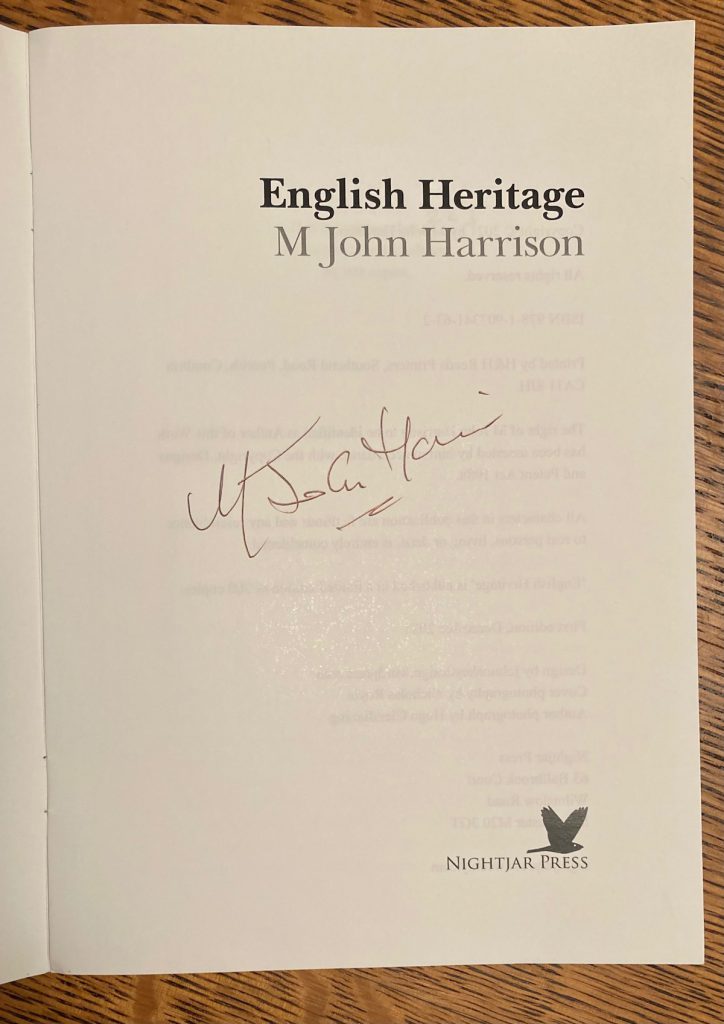
— M. John Harrison. English Heritage. Nightjar Press, [2021]. One of 300 signed copies.
— — —
— David R. Godine. Godine at Fifty. A Retrospective of Five Decades in the Life of an Independent Publisher. Godine, [2021].
A gorgeous and fun book, a richly illustrated memoir of people and books and life, a remarkable story well told. I’ve known Godine for half of these years, and it was a delight to see a few familiar books and many titles I hadn’t seen before (it’s also a fabulous and eclectic list of books to read). Design by Sara Eisenman.
— — —
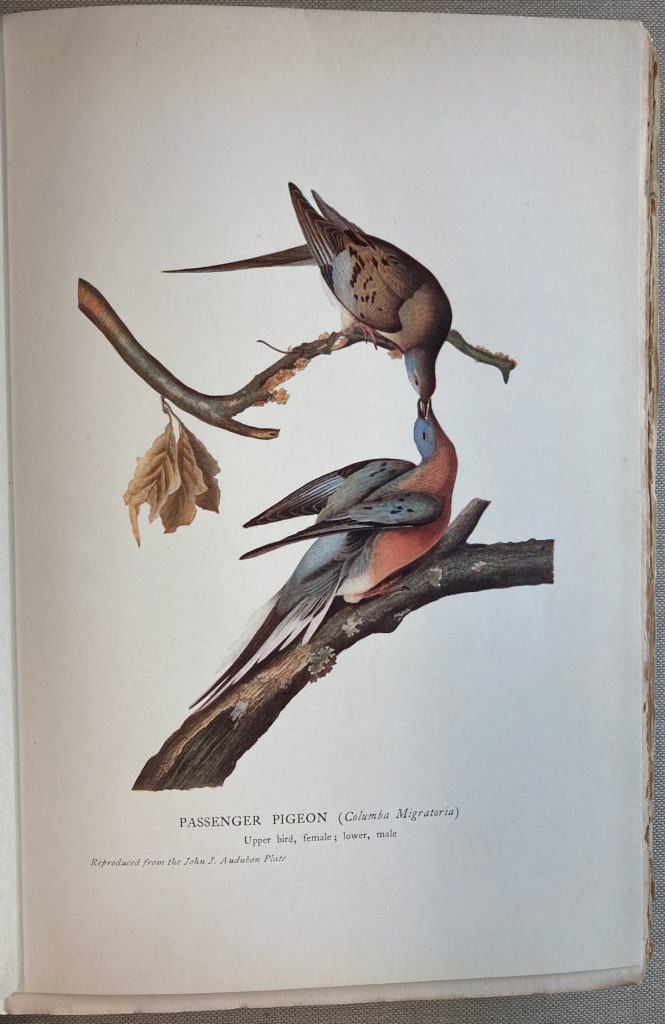
— W. B. Mershon. The Passenger Pigeon. The Outing Publishing Company, 1907.
“The history of the buffalo is repeated in that of the wild pigeon, the extermination of which was inspired by the same motive: the greed of man and the pursuit of the almighty dollar . . . when one thinks of the burning of forest trees which took centuries to grow, merely to clear a piece of land to grow crops, it is not to be wondered at that the wild pigeon, insignificant, and not even classed as a game bird, so soon became extinct.”
— — —
— Avram Davidson. Beer! Beer ! Beer ! [Or All the Seas with Oysters, 2021].
Reviewed here.
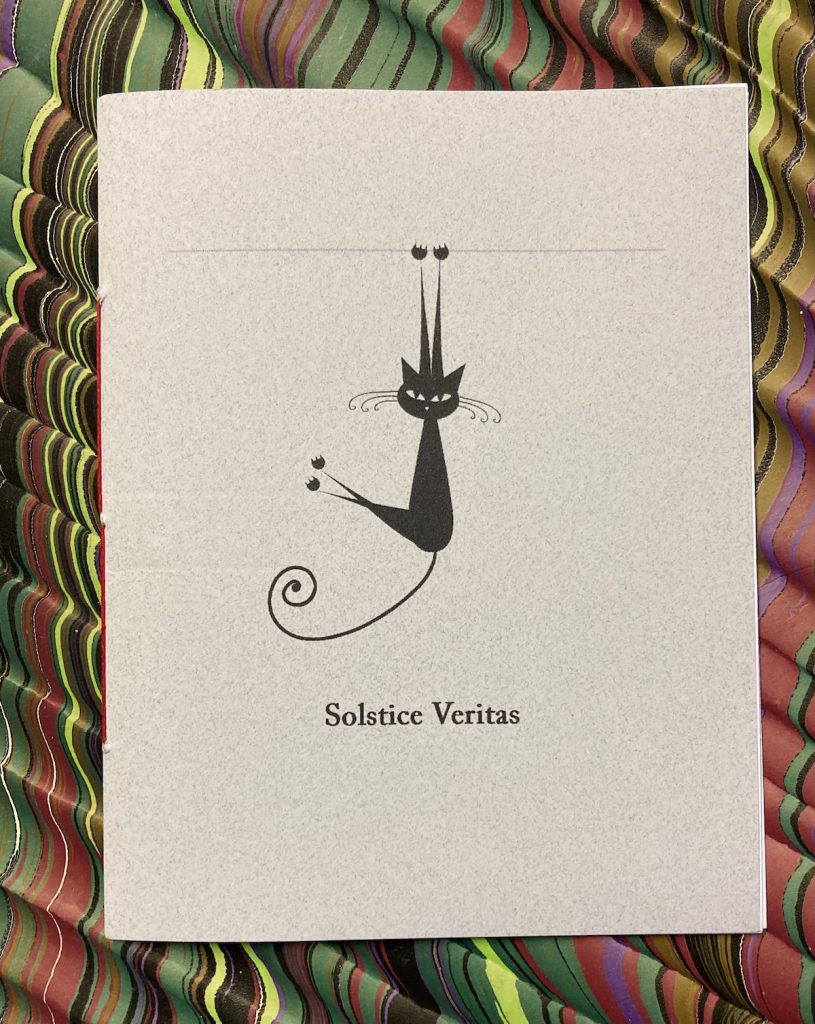
— Michael Swanwick. Solstice Veritas or The Christmas Cat and Other Memories. Dragonstairs Press, 2021.
— — —
— Meghan R. Constantinou. The Daniel Press. Pioneer of the Private Press Movement. The Grolier Club, 2021.
— Paul Theroux. Facing Ka‘ena Point. Privately printed [by Jesse Marsolais], 2021. 100 copies, signed by the author.
Distributed by Bull’s Head Rare Books.
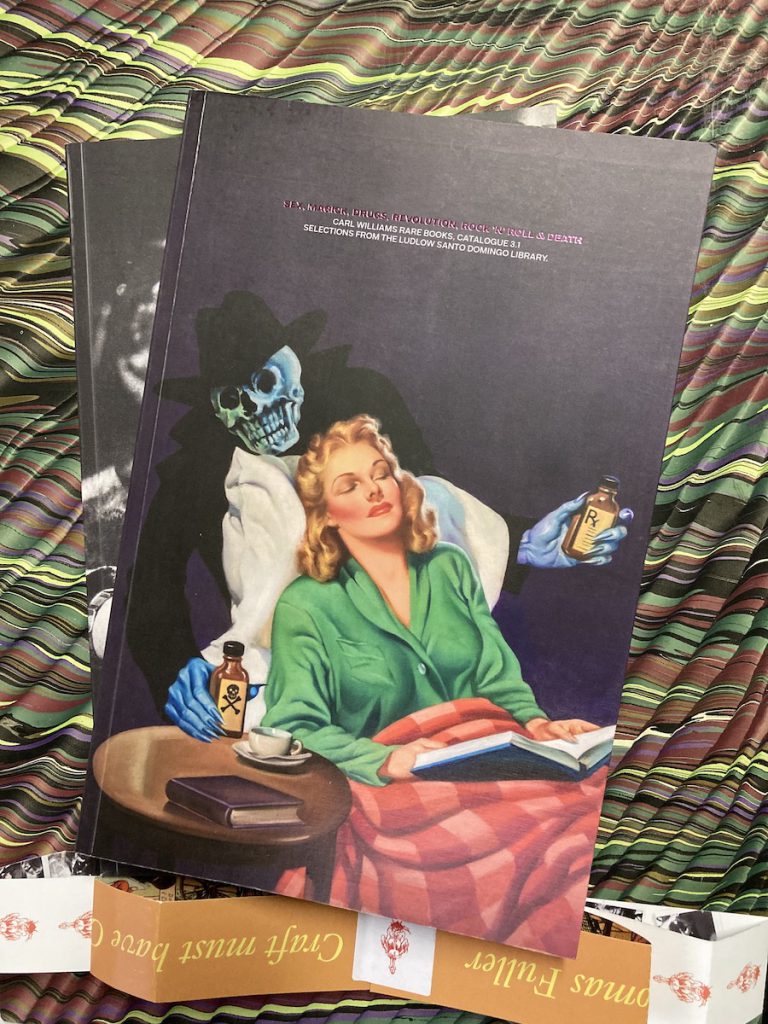
— Carl Williams Rare Books, Catalogue 3.1 & 3.2. Sex, Magick, Drugs, Revolution, Rock ’n’ Roll & Death, Selections from the Ludlow Santo Domingo Library. Carl Williams Rare Books, [November 2021].
Massive, two-volume illustrated catalogue of wild and fascinating stuff.
— — —
— Gilbert K. Chesterton. The Man Who Knew Too Much. Harper & Brothers, 1922.
— Dangerous Visions and New Worlds. Radical Science Fiction, 1950 to 1985. Edited by Andrew Nette and Iain McIntyre. PM, [2021].
Men at Work
Men at Work
A Preliminary Checklist of First Editions of the Books of Nevil Shute
Compiled by Henry Wessells
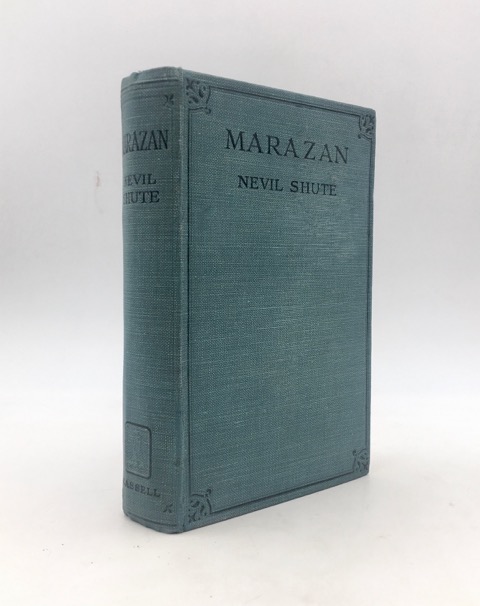
“People still read Nevil Shute, but
they do not . . . write much about him”
— Julian Smith
This checklist provides identifying data for first editions published in London and New York, as well as selected additional information on editions printed in Australia with the Heinemann imprint and on American reprint editions. This information is drawn from my notes while cataloguing the J. C. Boonshaft collection; I have also examined the copies at the Lilly Library (October 2023); for certain items not seen, I add descriptions from OCLC as noted. Each entry indicates title and pagination; title pages are not transcribed but dates not printed on the title page are enclosed in square brackets, e.g.: [1928]. The color of the binding is noted (wrappers, cloth, or boards), and characteristics of dust jackets (including prices when I can), as well as variants seen. I have not attempted to trace all of the volumes in the Heinemann uniform edition; nor the paperbacks. Corrections and additional information gratefully received. — HWW
1.1 Marazan. 319 pp. London: Cassell, 1926. First edition. Blue cloth, pictorial dust jacket.
1.2 Marazan. [viii], 256 pp. [First leaf is a blank]. London: Heinemann, 1951. First Heinemann edition, with a new preface by the author. Blue cloth. Dust jacket not seen.
2.1 So Disdained. [viii], 311, [1] pp. London: Cassell, [1928]. First edition. Red cloth titled in black. Imprint of The Greycaine Book Manufacturing Company Limited on last page of text, with code at foot: F25.528. (Lilly Library). Dust jacket not seen.
2.2 The Mysterious Aviator. [viii], 304 pp. Boston: Houghton Mifflin, 1928. First American edition. Blue cloth, dust jacket.
2.3 So Disdained. [x], 233 pp. London: Heinemann, [1952]. Blue cloth. Dust jacket not seen. Uniform edition. [New edition, 1951 (not seen). Reprinted 1952 (twice)].
3.1 Lonely Road. xii, 308 pages. London: Cassell, 1932. First edition. Black cloth, lettered in red. Not seen. OCLC: 28557522 (10 locations).
3.2 Lonely Road. [8], 302 pages. New York: William Morrow, 1932. First American edition. Tan cloth, spine and upper board lettered in yellow, pictorial dust jacket (spine and front panel) after painting by Cleo Damianakes, signed CLEONIKE; back panel listing ten titles, Lonely Road third, Black Elk Speaks tenth. (Lilly Library). OCLC: 8002451.
3.3.a Lonely Road. xii, 239 pp. London: Heinemann, [1953]. Blue cloth. Dust jacket not seen. Uniform edition. [New edition, 1951 (not seen). Reprinted twice, 1952 (not seen)]. Reprinted 1953.
4.1 Ruined City. 281, [1] pp. London: Cassell, [1938]. First edition. Black cloth. Dust jacket not seen.
4.2.a Kindling. [4], 279 pp. New York: William Morrow, 1938. First American edition, proof issue. Wrappers from dust jacket.
4.2.b Kindling. [4], 279 pp. New York: William Morrow, 1938. Special Advance Edition. Pink wrappers printed in black, publisher letter on front. One thousand copies printed. The spine announces the release date as late May or early June 1938.
4.2.c Kindling. [4], 279 pp. New York: William Morrow, 1938. First American edition. Oatmeal cloth lettered in red, dust jacket.
4.3.a Ruined City. [iv], 269 pp. London: Heinemann, [1951]. First Heinemann edition, proof copy. Wrappers printed in red (printed on a sheet of printer’s waste, an illustration of a hound from Dog Days by K F Barker).
4.3.b Ruined City. London: Heinemann, [1951]. Blue cloth, dust jacket listing 10 titles. Heinemann uniform edition.
5.1.a What Happened to the Corbetts. 267 pp. London: Heinemann, [1939]. Proof Copy. Drab wrappers, title printed in red.
5.1.b What Happened to the Corbetts. [viii], 267 pp. The first leaf is a blank. London: Heinemann, [1939]. One of 1000 copies for special distribution. Printed on laid paper. Decorated boards as issued without dust jacket. Publisher’s compliments slip loosely inserted. Smith: “his British publishers distributed a thousand free copies on publication day in April, 1939, to Air Raid Precaution workers and officials.”
5.1.c What Happened to the Corbetts. 267 pp. London: Heinemann, [1939]. First edition. Cloth, dust jacket. Not seen.
5.1.d First edition, second impression. Not seen.
5.1.e What Happened to the Corbetts. 267 pp. London: Heinemann, [1943?]. First edition. Light grey cloth, dust jacket with third impression on front flap. March 1943 gift inscription.
5.2.a Ordeal. [6], 280, [1] pp. New York: William Morrow, 1939. First American edition. Blue cloth. Dust jacket not seen.
5.2.b Ordeal. [6], 280, [1] pp. Toronto: McClelland & Stewart Limited, 1939. First Canadian edition, from American sheets. Navy blue cloth, dust jacket.
5.2.c Ordeal. [6], 280, [1] pp. New York: William Morrow, 1939. Book of the Month Club edition. Blue cloth, unpriced dust jacket.
5.3 What Happened to the Corbetts. London: Heinemann, [1952]. Blue cloth, dust jacket, listing 10 titles. Heinemann uniform edition. [New edition, 1951 (not seen); 1952 (reprinted twice)].
6.1 An Old Captivity. [viii], 312 pp. The first leaf is a blank. London : William Heinemann, [1940]. First edition. Yellow cloth, map endpapers, typographic dust jacket printed in red and blue. Price 8s.6d. (Lilly Library copy with label 4/ — NET). Reviews of What Happened to the Corbetts on back panel.
6.2.a An Old Captivity. [4], 333 pp. New York: William Morrow, 1940. First American edition, proof issue, stamped on fly title, Publication date Feb 21 1940 Price $2.50. Wrappers from pictorial dust jacket, with priced flaps.
6.2.b An Old Captivity. [4], 333, [2] pp. New York: William Morrow, 1940. First American edition. Tan cloth stamped in blue, map endpapers. Dust jacket not seen.
7.1 Landfall. A Channel Story. 269 pages. London : William Heinemann, [1940]. First edition. Not seen.
7.2.a Landfall. A Channel Story. [iv], 284 pages. New York: William Morrow & Company, 1940. Blue green cloth lettered in blue, pictorial dust jacket (jacket not seen).
8.1 Pied Piper. [4], 283 pp. London: Heinemann, [1942]. First edition. Light brown cloth. Dust jacket with crossed pipes and laurels, in red, white, and blue, reviews of Landfall on back panel. Price 8s.6d. NET. (Lilly Library).
8.2.a Pied Piper. [4], 306 pp. New York: William Morrow, 1942. First American edition, proof issue, stamped on flyleaf, Publication date Jan 5 1942 Price $2.50. Wrappers from dust jacket, with priced flaps.
8.2.b Pied Piper. [4], 306 pp. New York: William Morrow, 1942. First American edition. Light blue cloth, dust jacket.
8.3.a Pied Piper. Garden City: The Sun Dial Press, [1942]. 1942 The Sun Dial Press on verso of title. Blue green cloth, spine title panel in dark blue.
8.4.a Pied Piper. New York: The Book League of America, [n.d.]. Blue cloth, spine title in gilt, dust jacket, back panel: Former Selections Still Available to Members at $1.39 Each, with list of six titles.
9.1 Pastoral. [iv], 218, [1, Acknowledgments]. pp. London: Heinemann, [1944]. First edition. Green cloth, calligraphic dust jacket, signed Geo. Mansell, 4 reviews on back panel. Price 8s.6d. NET. (Lilly Library).
9.2.a Pastoral. [viii], 246 pp. New York: William Morrow, 1944. First American edition. Tan cloth, dust jacket. Copy inscribed by the author to his wife, “Frances with love from Nevil September 1944”.
9.2.b Pastoral. New York: William Morrow, 1944. Book of the Month Club edition. Tan cloth, unpriced dust jacket.
9.3 Pastoral. [iv], 219, [1] pp. London [i.e., Melbourne]: Heinemann, 1945. First Australian edition. Brown cloth, dust jacket. Title page verso: Wholly set up and printed in Australia for the Oxford University Press, Leighton House, Melbourne, by the Adventure Printing Office, Marlborough House, Adelaide.
10.1 Most Secret. [iv], 275 pp. London: Heinemann, [1945]. First edition. Red cloth, map endsheets (West Coast of France. Ushant to the Glenan Isles). Calligraphic dust jacket, lettering in red and white against a black field signed Geo. Mansell, 5 reviews for Pastoral on back panel. (Lilly Library, price clipped).
10.2.a Most Secret. 310 pp. New York: William Morrow, 1945. First American edition. Tan cloth, dust jacket.
10.2.b Second printing, 1945. Tan cloth.
10.2.c Most Secret. New York: Sun Dial Press, [1946]. Blue cloth, dust jacket
10.3 Most Secret. [iv], 275 pp. London: Heinemann, [1946]. First Australian edition. Not seen. OCLC: 223159949 (State Library of New South Wales).
11.1 Vinland the Good. vi, 143, [3 blanks] pp. London: Heinemann, [1946]. First edition. Black cloth, map endsheets, typographic dust jacket printed in red. (Lilly Library, price clipped).
11.2 Vinland the Good. Title page and section titles printed in purple and black. 126 pp. New York: William Morrow, [1946]. First edition. Cloth backed boards, dust jacket.
12.1.a The Chequer Board. 317 pp. London: Heinemann, [1946]. Proof Copy. Tan wrappers, title printed in black (on printer’s waste for Come with Me by Margaret Kennedy and Basil Dean).
12.1.b The Chequer Board. [vi], 317 pp. London: Heinemann, [1947]. First edition. Dark red cloth. Dust jacket not seen (Lilly Library). Dust jacket, possible later state with Book Society Choice on front flap, price 9s6d.
12.2.a The Chequer Board. New York: William Morrow, [1946]. First American edition. Red cloth, dust jacket.
12.2.b The Chequer Board. New York: William Morrow, [1946]. Book club edition. Red cloth, unpriced dust jacket.
Note: Anderson reports that The Chequer Board “was a Literary Guild selection and eventually sold over 600,000 copies” (155).
13.1.a No Highway. [vi], 314, [1] pp. London: Heinemann, [1948]. First edition. Red cloth. Dust jacket not seen. Fourth impression dust jacket, back panel with five blurbs on the Novels of Nevil Shute.
13.2 No Highway. 346 pp. New York: William Morrow, 1948. First American edition. Grey cloth, dust jacket. Copy inscribed by the author to his wife, “Frances, with love, from Nevil, July 1948”.
14.1.a A Town Like Alice. [vi], 332, [1, Author’s Note] pp. London: Heinemann, [1950]. First edition. Red cloth, spine titled in gilt, upper board in blind with NS cypher, dust jacket. Probable priority of jackets: A. Price on inside flap. B. Book Society Choice band added. C. Book Society Choice and price 10s 6d on inside flap. (Lilly Library, state C, crudely price clipped).
14.1.b A Town Like Alice. [vii], 332, [1] pp. Melbourne: Heinemann, [1950]. Printed at the Windmill Press, Kingswood, Surrey. First Australian edition. Red cloth. Dust jacket not seen.
14.2 The Legacy. [6], 308 pp. New York: William Morrow, 1950. First American edition. Light green cloth, dust jacket.
15.1 Round the Bend. [vi], 362 pp. Melbourne London Toronto: Heinemann, [1951]. Cloth, map endpapers, dust jacket by Val Biro, at foot of front flap Book Society Choice in blue, 12s.6d. NET in black; back flap with Uniform Ed., 6s each, and at foot: Also available No Highway 10s6d. (Lilly Library.
15.2.a Round the Bend. [8], 341 pp. New York: William Morrow, 1951. First American edition. Black cloth backed boards, map endsheets, dust jacket. Copy inscribed by the author, “For Mug(?) from Nevil May 1951”.
15.2.b Round the Bend. New York: William Morrow, 1951. Book club edition. Black cloth backed boards, map endsheets. Dot in blind on lower board.
16.1.a The Far Country. [vi], 333 pp. Melbourne London Toronto: Heinemann, [1952]. Printed at the Windmill Press, Kingswood, Surrey. First edition. Red cloth, dust jacket by Val Biro, at foot of front flap Book Society Recommendation in small italics, 12s.6d.
16.1.b The Far Country. 326 pp. Melbourne London Toronto: Heinemann, [1952]. Printed at the Windmill Press, Kingswood, Surrey. First Australian edition. Red cloth, dust jacket by Val Biro.
16.1.c The Far Country. [vi], 239 pp. London: Heinemann, [1953]. New edition. Burgundy cloth, dust jacket, back panel listing 12 numbered titles of the Uniform Edition.
16.2.a The Far Country. [viii], 343 pp. New York: William Morrow, 1952. First American edition. Tan cloth, dust jacket by Charles V. John.
16.2.b The Far Country. New York: William Morrow, [1952]. Blue coated cloth, dust jacket by Charles V. John.
17.1.a In the Wet. vi, 304, [1] pp. Melbourne London Toronto: Heinemann, [1953]. Printed at The Windmill Press, Kingswood, Surrey. Red cloth, dust jacket by Val Biro, priced 12s. 6d. net.
17.1.b In the Wet. [vi], 350, [1, Author’s Note] pp. Melbourne: Heinemann, [1953]. First Australian edition. Title page verso: Wholly set up, printed and bound in Australia by The Specialty Press, Limited. Green cloth, pictorial dust jacket by Val Biro. (Lilly Library, price clipped). Also seen in grey cloth.
17.2 In the Wet. [viii], 339 pp. New York: William Morrow, 1953. First American edition. Blue cloth titled in yellow, pictorial dust jacket by Barye Phillips. Also seen: 4th printing, August 1956.
18.1.a Slide Rule. The Autobiography of an Engineer. Frontispiece and 8 plates from photographs. [vi], 249 pp. London: Heinemann, 1954. First edition. Red cloth, dust jacket priced 18s. Wrapper design by A. E. Barlow. (Lilly Library price clipped). Reprinted 1954 (twice), 1955 (three times). Third Impression statement on jacket flap; Fourth Impression statement on jacket flap, back panel stamped Overseas Edition Not for Canada.
18.2 Slide Rule. The Autobiography of an Engineer. With 4 leaves of plates from photographs. [x], 240 pp. New York: William Morrow, 1954. First American edition. Dark grey cloth, dust jacket.
19.1.a Requiem for a Wren. 284 pp. London: Heinemann, [1955]. Proof Copy. Tan wrappers, title printed in black
19.1.b Requiem for a Wren. [8], 284 pp. The first leaf is a blank. London: Heinemann, [1955]. First edition. Red cloth, dust jacket by Val Biro. Price 12s 6 d net. (Lilly Library)
19.1.c Requiem for a Wren. 284 pp. Melbourne: Heinemann, [1955]. First Australian edition. Red cloth, dust jacket. Copy inscribed by the author to his wife, “For Frances from Nevil with love April 1955”
19.2.a The Breaking Wave. [vi], 282 pp. New York: William Morrow, 1955. First American edition. Green cloth, dust jacket.
19.2.b The Breaking Wave. New York: William Morrow, 1955. Book Club Edition. Green boards, dust jacket.
20.1.a Beyond the Black Stump. [vi], 297 pp. Melbourne London Toronto [Printed at the Windmill Press, Kingswood, Surrey]: Heinemann, [1956]. Red cloth, spine titled in gilt, dust jacket by Val Biro. Price on front flap 15 s net.
20.2.a Beyond the Black Stump. 316 pp. New York: William Morrow, 1956. First American edition. Green cloth, dust jacket.
20.3.a Beyond the Black Stump. [London:] The Book Club, [1956]. Light blue cloth, dust jacket, front flap stating This Edition Issued by the Book Club.
21.1.a On the Beach. [viii], 312 pp. The first leaf is a blank. London: Heinemann, [1957]. First edition. Burgundy cloth, dust jacket by John Rowland. Price on front flap 15 s. NET.
21.1.b On the Beach. 312 pp. Melbourne: Heinemann, [1957]. First Australian edition. Burgundy cloth, pictorial dust jacket.
21.2.a On the Beach. 320 pp. New York: William Morrow, 1957. First American edition. Grey cloth, pictorial dust jacket.
22.1.a The Rainbow and the Rose. [vi], 306 pp. London: Heinemann, [1958]. First edition. Burgundy cloth, pictorial dust jacket by Stein. Price on front flap 16 s. NET.
22.1.b The Rainbow and the Rose. [vi], 306 pp. London: Heinemann, [1958]. First edition, Australian issue of dust jacket. Burgundy cloth, pictorial dust jacket by Stein.
22.2.a The Rainbow and the Rose. [viii], 310 pp. New York: William Morrow, 1958. First American edition. Yellow cloth spine, blue boards, dust jacket.
23.1.a Trustee from the Toolroom. [vi], 312, [2, blank] pp. London: Heinemann, [1960]. First edition. Red cloth, dust jacket. Wrapper design by Fratini. Lilly Library copy is price clipped; back flap lists 17 titles in uniform edition. (see below), possibly a later state?
23.1.b Trustee from the Toolroom. The Book Club, [1960]. Book club edition. Grey cloth, dust jacket.
23.2.a Trustee from the Toolroom. 309 pp. New York: William Morrow, [1960]. First American edition. Black cloth backed boards, dust jacket by Charles Geer.
23.2.b Trustee from the Toolroom. Book club edition. Black cloth backed boards, dust jacket. Dot in blind on lower board.
24.1.a Stephen Morris. [xii], 273 pp. London: Heinemann, [1961]. Uncorrected Proof Copy. Pale green wrappers, title printed in black. With publisher’s compliments slip loosely inserted.
24.1.b Stephen Morris. [xii], 273 pp. The first leaf is a blank. London: Heinemann, [1961]. First edition. Blue cloth, dust jacket. Wrapper design by Fratini. Price 16s NET. Back flap lists 14 titles in uniform edition. (Lilly Library).
24.1.c Stephen Morris. [xii], 273 pp. London: Heinemann, [1961]. First edition, Australian issue dust jacket. Blue cloth, dust jacket.
24.2.a Stephen Morris. [xii], 273 pp. New York: William Morrow, 1961. First American edition, advance reading copy. Blue cloth backed boards, illustrated dust jacket. With publisher’s slip announcing publication date as 11 September 1961.
25 The Seafarers. Kerhonkson, N.Y.: Paper Tiger, 2002. Written 1946, published “with minor rewrites by the Nevil Shute Foundation” (Anderson, 172). Not seen.
Stray notes on uniform editions
A. Morrow, [after 1945]. Cloth, back panel of dust jacket listing Five Beloved Novels
A.1 An Old Captivity. Beige cloth, spine titled and stamped in blue. Dust jacket in blue.
A.2 Landfall. Beige cloth, spine titled and stamped in brown. Dust jacket in brown.
A.3 Pied Piper. Not seen.
A.4 Pastoral. Not seen.
A.5 Most Secret. Not seen.
B. Heinemann, [1951 onward]. Blue cloth, dust jackets.
Marazan (see 1.2).
So Ordained (see 2.3).
Lonely Road (see 3.3.a).
Ruined City (see 4.3.a, 4.3.b). Dust jacket, listing 10 titles.
What Happened to the Corbetts (see 5.3). Dust jacket, listing 12 numbered titles:
1. Marazan
2. So Disdained
3. Lonely Road
4. Ruined City
5. What Happened to the Corbetts
6. An Old Captivity
7. Landfall
8. Pied Piper
9. Pastoral
10. Most Secret
11. The Chequer Board
12. No Highway
N.B.: Heinemann edition of Stephen Morris (see 24.1.b), dust jacket back flap lists 14 numbered titles, adding:
13. In the Wet
14. The Far Country
N.B.: Heinemann edition of Trustee from the Toolroom (see 23.1.a), dust jacket back flap lists 17 numbered titles, adding:
15. Round the Bend
16. Requiem for a Wren
17. A Town like Alice
C. Complete Works. London: Distributed by Heron Books, [n.d., 1968-1969]. 22 vols., uniformly bound in red rexine, without dust jacket. Not seen. OCLC: 221640306 (State Library of New South Wales).
One volume only seen: Beyond the Black Stump. Heron Books, n.d. [1969], in red rexine.
On Shute:
— Julian Smith. Nevil Shute. 166 pp. Boston: Twayne Publishers, [1976]. Red cloth. Twayne’s English Author Series 190.
— Corbin S. Carnell. “Nevil Shute”, pp. 213-217 in: British Fantasy and Science-Fiction Writers, 1918-1960, edited by Darren Harris-Fain. Dictionary of Literary Biography. Volume 255. Detroit: Gale Group, 2002.
— John Anderson. Parallel Motion A Biography of Nevil Shute. xii, 308, [1] pp. Kerhonkson, N.Y.: Paper Tiger, 2011. Boards.
— John Clute. “Nevil Shute”, in: The Encyclopedia of Science Fiction, Third Edition. http://sf-encyclopedia.com/entry/shute_nevil : “Some of his earlier fiction, by taking advantage of his intense and very up-to-date knowledge of aeronautics (and of boffins or back-room boys), verges very closely on sf.”
— — —
Afterword
I had read some Nevil Shute: not as much as I thought. My father, an engineer, had copies of Slide Rule and Trustee from the Toolroom, which I read as a teenager, along with On the Beach and one or two others. I read Marazan and Lonely Road while working on the collection, as well as the Smith monograph and Anderson’s engaging biography. [HWW]
First published in the Newsletter of the Nevil Shute Norway Foundation, October 2021. With Revisions (December 2021; October 2023).
— — —


